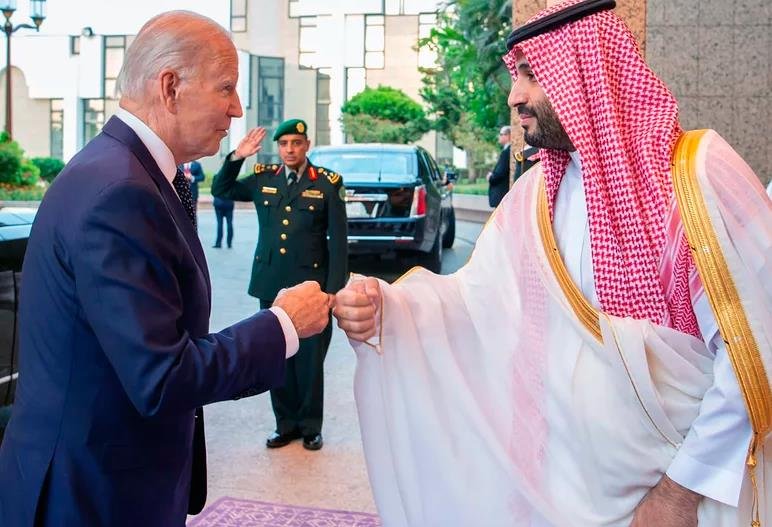With less than three months left in his presidency, President Joe Biden is eager to finalize a bilateral security agreement with Saudi Arabia, despite the Biden administration’s inability to secure a broader normalization deal with Israel. As the clock ticks down on his term, Biden’s pursuit of this deal signals the continued importance of US-Saudi relations, even amid tensions over human rights concerns.
A Last-Ditch Effort: Biden’s Security Agreement Push
In the waning months of his presidency, Joe Biden is focused on securing a bilateral security pact with Saudi Arabia, one that will provide a foundation for continued cooperation without requiring Saudi Arabia to normalize relations with Israel. This is a sharp departure from the earlier aim of finalizing an Israel-Saudi deal akin to the Abraham Accords, which brokered normalization agreements between Israel and several Arab nations under former President Donald Trump.
According to a report by Barak Ravid of Axios, the US and Saudi Arabia have been in discussions about a security agreement that would stop short of a formal defense treaty but still deepen military cooperation. Saudi Crown Prince Mohammed bin Salman (MBS) and the Biden administration are eager to strike this deal before Biden exits the White House in January.
The proposed agreement would offer Saudi Arabia access to advanced US military technology and potentially greater defense support but would not include the full array of provisions that the US had previously discussed with Riyadh, such as nuclear technology or a mutual defense pact.

Tensions and Challenges: The Road to Normalization with Israel
During his campaign, Biden positioned himself as a staunch critic of Saudi Arabia’s human rights record, particularly in relation to the murder of Washington Post journalist Jamal Khashoggi and the ongoing conflict in Yemen. However, after taking office, the Biden administration opted for a pragmatic approach, initially imposing some restrictions on arms sales to Saudi Arabia before eventually lifting them.
Despite these concerns, Biden’s administration has pursued ways to deepen ties with Riyadh, seeking to expand upon the diplomatic framework of the Abraham Accords, which was brokered by the Trump administration in 2020. The Accords saw the normalization of relations between Israel and several Arab nations, with the US offering military and economic incentives to those countries.
Before the October 7 Hamas attack on Israel, the US was reportedly nearing a deal with Israel and Saudi Arabia that would provide Riyadh with advanced weaponry, a mutual defense agreement, and even nuclear technology. However, the outbreak of violence between Israel and Gaza, coupled with Prime Minister Benjamin Netanyahu’s refusal to entertain a ceasefire, derailed any further discussions on a Saudi-Israel normalization pact.
The Biden administration’s hopes of using Saudi-Israeli normalization as a diplomatic lever to rebuild Gaza have now become a non-starter, particularly as Israel’s actions in Gaza draw widespread international condemnation.
Saudi Arabia’s Stance: A Stronghold of Regional Influence
Saudi Arabia’s position on Israel has been a defining feature of its foreign policy. Riyadh has long insisted that any normalization deal with Israel must include a resolution to the Palestinian issue, particularly based on the 1967 borders, with Jerusalem as the capital of Palestine. This condition has made it difficult for the US to broker a deal between the two countries, especially with Israel’s ongoing military operations in Gaza.
As much as the US seeks to push for Saudi-Israeli normalization, the kingdom’s commitment to Palestinian statehood has remained unwavering. This has caused significant tension between Washington and Riyadh, particularly as the US has supported Israel’s military actions in Gaza, which have sparked widespread protests in the Arab world and beyond.
Saudi Arabia has repeatedly stressed its willingness to work with the US on regional security issues, such as counterterrorism and defense against Iranian influence. Yet, the kingdom has made it clear that any security partnership with the US is contingent on its stance on Palestine.
Why the Rush? The End of Biden’s Term Looms
Given Biden’s commitment to securing a deal with Saudi Arabia, it raises questions as to why the administration is pushing so hard for a bilateral security agreement with the kingdom so late in the president’s term. A security agreement would certainly bolster the US-Saudi relationship, but it may also be seen as an attempt to shore up US influence in the region before a potential shift in US foreign policy under a new administration.
The timing of this potential agreement is significant, as President Biden’s successor could take a vastly different approach to the Middle East. Former President Donald Trump, who is running for office again, has already signalled his intention to revive his “America First” policies, which included a deep alignment with Israel and a more transactional approach to Saudi Arabia.
By signing a security pact with Saudi Arabia, Biden could leave his successor with a stronger regional foothold in the Gulf, which could serve as a strategic buffer against Iranian ambitions in the region. At the same time, it could help the US maintain a presence in Saudi Arabia while avoiding a broader conflict over the normalization of relations with Israel.
A Controversial Alliance
Saudi Arabia’s human rights record has long been a point of contention between the US and Riyadh, with widespread condemnation over the war in Yemen and the killing of Khashoggi. The proposed security pact, coming in the final months of Biden’s presidency, could spark further controversy, particularly as it may be seen as rewarding a regime that has been criticized for its repressive policies.
For the Biden administration, however, the deal would be framed as a necessary security measure, aimed at countering regional threats, especially Iran. But as the US deepens its security ties with Saudi Arabia, the question remains: can a close partnership with a country with such a fraught human rights record be reconciled with the values of the Biden administration?
